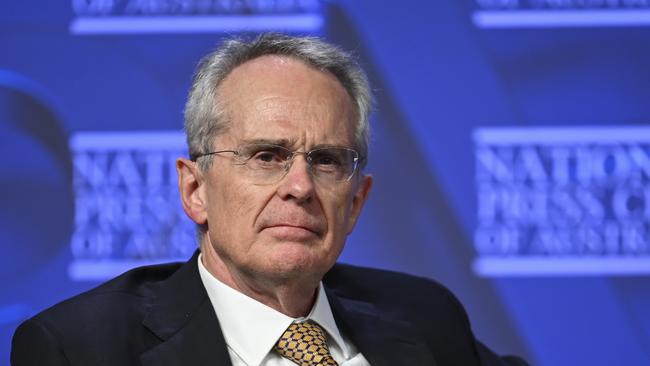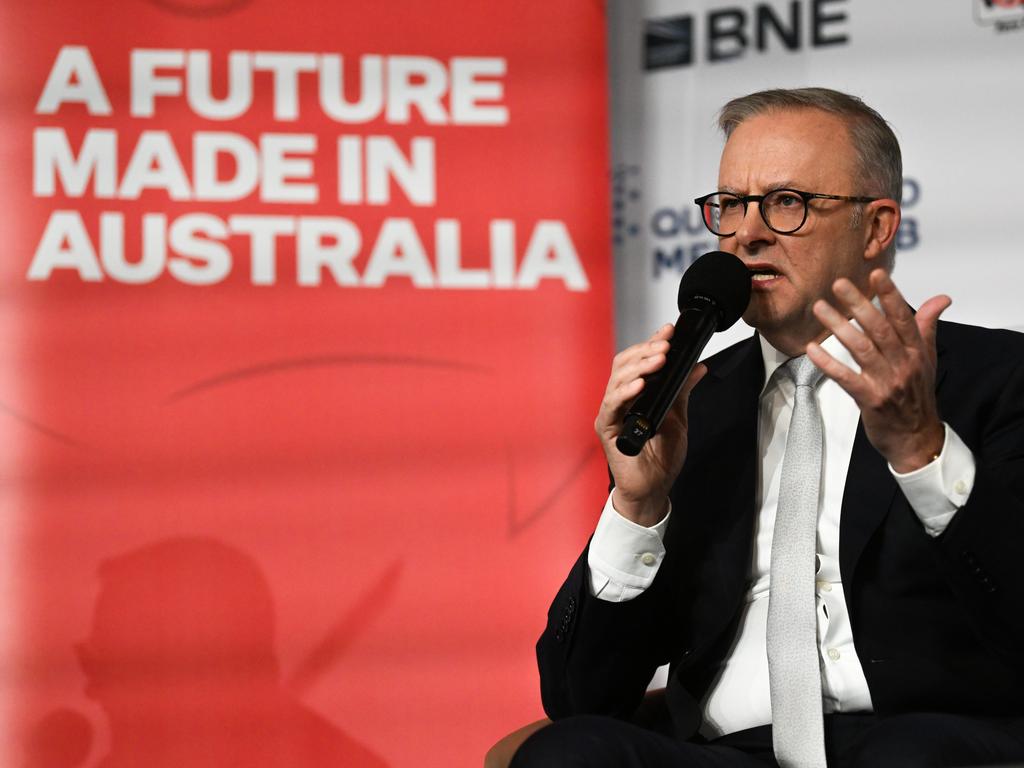Flawed Made in Australia plan ‘to sink clean energy’, says Rod Sims
Former ACCC tsar Rod Sims says an ad hoc ‘Made in Australia’ approach to net-zero transition risks saddling the nation with high-cost solar panels and wind farms.

Former competition tsar Rod Sims says embracing an ad hoc “Made in Australia” approach to net zero transition by 2050 could “destroy” Australia’s chances of becoming a clean energy superpower.
The warning came as Jim Chalmers rejected criticism of the government’s Made in Australia agenda by former Liberal prime minister, John Howard, as belonging to “another era.”
“Our goal here is to align our national security interests, our economic security interests, in a way that makes us an indispensable part of the global net zero economy,” the Treasurer said.
“A future made in Australia and our policies around a renewable energy superpower are all about grabbing that opportunity.”
In an address to the Melbourne Economic Forum on Wednesday, Mr Sims took aim at those who belonged to the “Made in Australia” camp as well as those he regarded as “market fundamentalists”.
The chair of the Superpower Institute – a body dedicated to helping the nation capitalise on the green energy transition – Mr Sims used his address to warn against saddling the nation with high-cost solar panels and wind farms.
The former chair of the competition watchdog also made clear there was a role for government in helping the nation make the most of the coming green revolution.
Mr Sims said government support needed to be finely geared towards areas where Australia had a comparative advantage – such as in green iron.
He also listed conditions that would be needed to govern any taxpayer support for industry. First, he said, assistance should be aimed at the so-called “superpower industries” where Australia “has or will have a comparative advantage due to the net zero transition.”
Second, the purpose of any assistance needed to be clearly defined to address well-understood problems.
Third, there should be clear “qualification rules” for assistance.
And, fourth, support needed to be fully funded to ensure we maintained a strong budget position.
Mr Sims said it was unclear how the Made in Australia policy would work. “We have the ‘Made in Australia’ group. The problem here is that it is unclear what this group seeks. Make everything we need, import nothing? What is the framework in this slogan for deciding what Australia does, and does not, make in Australia?”
He expressed grave concerns that simply throwing money at any green energy project would “destroy the Superpower opportunity … Without a clear framework, Australia will take a series of ad hoc measures that invite rent seeking by businesses, raise Australia’s cost structure and lower our productivity.”
Mr Sims asked how the nation could achieve “low-cost renewable energy if we are saddled with high-cost solar panels, wind farms and electrolysers through a ‘buy local’ imperative?”
This approach would destroy our ability to make the most of the comparative advantage in making green energy-intensive exports such as green steel. It would also displace investment that could be better allocated and force labour into unproductive areas, he said.
His preferred approach to making the transition to net zero would only allow for goods to be made in Australia “where the economics have ‘flipped’.”
“Green iron should be made here,” he said. “All overseas studies I am aware of suggest Australia is likely the cheapest place in the world to make green iron. And those seeking to make green iron by importing hydrogen will be uncompetitive.”
He said the world needed Australia to make green products because the nation had more low-cost renewable energy resources than it needed. By contrast, Japan, Korea, most of Europe and China did not have sufficient renewable energy resources to make all the electricity they needed. “They will need to either import renewable energy, ammonia as a derivative of hydrogen and/or use nuclear energy to meet their domestic electricity needs,” he said.
He urged the government to clarify its Made in Australia policy. If it amounted to a suite of ad hoc measures that invited rent seeking and raised Australia’s cost structure while lowering productivity, it would “kill the superpower ambition”. If the government chose to produce goods in which we had a comparative advantage in the net zero world through clear qualification mechanisms, it “must be applauded”.








To join the conversation, please log in. Don't have an account? Register
Join the conversation, you are commenting as Logout